Iranian Boxing Federation Head To Defect In Spain
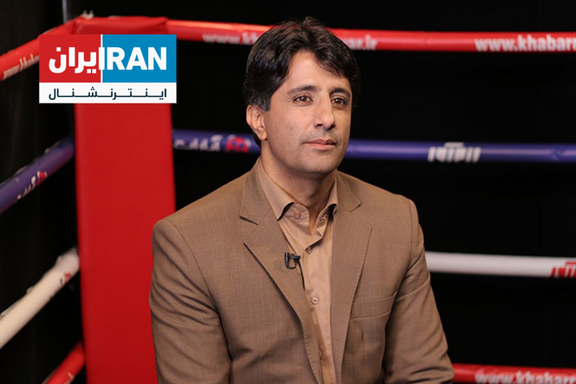
Reports say the head of Boxing Federation of the Islamic Republic, who travelled to Spain with his team, has no intention of returning to Iran.

Reports say the head of Boxing Federation of the Islamic Republic, who travelled to Spain with his team, has no intention of returning to Iran.
Hossein Suri is currently in La Nucía accompanying the Iranian team to participate in the IBA Youth Men’s and Women’s World Boxing Championships.
According to the reports received by Iran International, Suri has raised harsh criticisms against the Islamic Republic announcing that from now on he considers himself the “Head of Boxing Federation of Free Iran.”
Hossein Suri, who is from Sistan and Baluchestan province, had repeatedly criticized the killing and suppression of citizens by the government on his Instagram page.
Based on information received from the national team's camp, passports, cell phones and the money of all members of the national team have been confiscated by the accompanying Iranian security guards. Suri has also said that members of the team are also free to defect.
Around 30 Iranian athletes have defected in recent years, seeking asylum in other countries.
In addition to dress code restrictions, another issue forcing Iranian athletes to defect is Tehran’s policy of not allowing them to compete against Israelis.
Many Iranian athletes have also displayed solidarity with 2022 protest movement at international games despite threats of punishment.
Authorities have made serious threats against athletes and other celebrities to stop them from public displays of solidarity with protesters but to no avail.
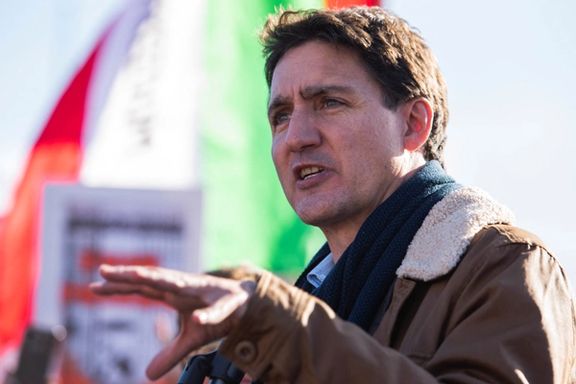
Canada's spy agency has launched an investigation on what it calls multiple “credible” death threats against individuals on its soil by the Islamic Republic.
CBC News said on Friday that the Canadian Security Intelligence Service (CSIS) is aware that some state agents of the Islamic Republic are “monitoring and intimidating” people inside Canada to silence those who speak against the regime.
“CSIS is actively investigating several threats to life emanating from the Islamic Republic of Iran based on credible intelligence,” CSIS spokesperson Eric Balsam said in a media statement.
“Ultimately, these hostile activities and foreign interference undermine the security of Canada and Canadians, as well as our democratic values and sovereignty,” added CSIS.
This is the first time CSIS confirms several ongoing investigations on “lethal threats to Canadians and people located in Canada” emanating from Iran.
Threats by Iran’s intelligence agencies are not just in Canada. UK’s intelligence authorities announced Wednesday they have discovered at least 10 “potential threats” since January to “kidnap or even kill British or UK-based individuals perceived as enemies of the regime.”
MI5 Director General, Ken McCallum noted that except Russia and China, the Islamic Republic is a “mounting concern.”
During his annual threat update in Thames House, London, he underlined that Iran is a state actor which most frequently crosses into terrorism.
“Iran projects threat to the UK directly, through its aggressive intelligence services. At its sharpest this includes ambitions to kidnap or even kill British or UK-based individuals perceived as enemies of the regime,” added McCallum.
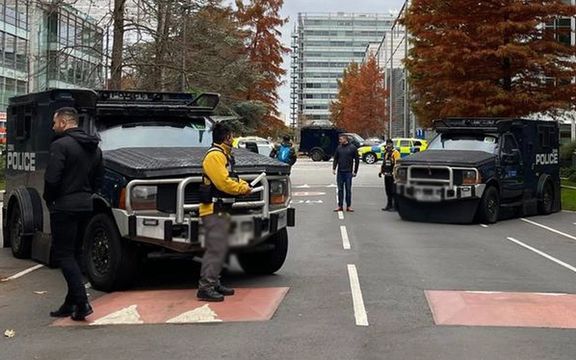
London’s Metropolitan Police has placed armed police forces outside Iran International’s headquarters following threats by the Iranian regime against its journalist.
The Times daily national newspaper reported on Saturday that Scotland Yard has positioned armed vehicles in front of the TV channel.
Iran International has confirmed there have been police vehicles at the building but it was “all Met-led and not in response to a request by us”.
A spokesman for Iran International has told the Times it was believed the police forces were carrying out a reassurance and deterrence operation.
“We don’t know how long the Armed Response Vehicles will be deployed but staff continue to take precautions as previously advised by our security director,” he added.
Britain’s MI5 said on November 16 that UK authorities have discovered at least 10 “potential threats” since January to “kidnap or even kill British or UK-based individuals perceived as enemies of the regime.”
Faced with nationwide antigovernment protests since mid-September, the Islamic Republic has blamed foreign-based Persian broadcasters such as BBC Persian and Iran International of “fomenting unrest”, while all media in the country are under tight government control and present protesters as “rioters” and “terrorists”.
Iran’s Intelligence Minister Esmail Khatib on November 9 said the Islamic Republic regards Iran International as “a terrorist organization,” adding that its workers and anyone affiliated with the channel will be pursued by the Ministry of Intelligence.
Iran has a long record of targeting dissidents and independent journalists who found refuge in other countries. Assassinations and kidnappings abroad have been common since the establishment of clerical rule in 1979.
In the latest example of terror operations abroad, Iranian intelligence abducted dissident journalist Ruhollah Zam who was visiting Iraq in 2019 and took him back to Iran where he was executed in 2020.
The scale of the police deployment to protect a media organization is unprecedented in recent years and might be a sign that UK authorities take the threat to Iran International very seriously.
Earlier, Volant Media, the parent company of Iran International, said that two of its journalists had recently been notified of direct threats. It said in a statement the Metropolitan Police have formally notified both journalists that these threats represent an imminent, credible and significant risk to their lives and those of their families.
“Other members of our staff have also been informed directly by the Metropolitan Police of separate threats," read the statement.
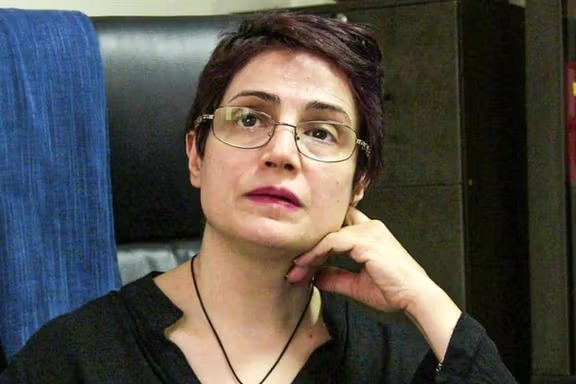
Iranian human rights lawyer, Nasrin Sotoudeh, has won the Robert Badinter Award at the 8th World Congress Against the Death Penalty in Berlin.
The award was given to Sotoudeh for her activities in the fight against the death penalty and her efforts to abolish “this inhumane and irreversible punishment.”
Many people were nominated for this award, but Sotoudeh was selected as the winner from among four finalists. She has spent many years in prison in Iran after defending other human rights advocates.
Robert Badinter, the former Minister of Justice of France, has been a long-time activist for the abolition of the death penalty.
Mahmoud Amiri Moghadam, Director of Oslo-based Iran Human Rights Organization received this award on behalf of Nasrin Sotoudeh and recited her message.
Referring to the death sentences issued against Iranian youths for participating in the anti-government protests, Sotoudeh in her message, asked the world to be the eyes and ears of Iranians at this difficult time.
The 8th World Congress against the Death Penalty took place in Berlin 15-18 November 2022. This event brings together more than1,000 participants from 90 countries– human rights activists and public figures who work towards the abolition of death penalty.
Amnesty International on Wednesday said the Islamic Republic is seeking to execute at least 21 people arrested during the protests after “sham trials” to intimidate dissent.
Sotoudeh represented imprisoned Iranian opposition activists and politicians as well as prisoners sentenced to death for crimes committed when they were minors.

Iran has lost $450 billion in oil revenues in a decade because of international and US sanctions, causing a serious economic crisis, a newspaper in Tehran says.
Aftab News website based its calculation of lost revenues on OPEC’s annual oil export numbers and estimated that UN Security Council sanctions that came into play a decade ago and lasted more than 3 years, followed by US sanctions since 2018 cost Iran dearly.
In absence of sanctions, Iran was exporting anywhere between 2.2-2.5 million barrels of crude oil per day, which depending on global prices could generate annual revenues of up to $100 billion. But when sanctions were imposed these exports dwindled to as little as 200,000 barrels per day, as was the case in 2019. Currently, by circumventing existing US sanctions Tehran is believed to be selling up to one million barrels mostly to China.
Around 2010, Iran was generating revenues close to $100 billion while in 2021, OPEC estimated oil export income of just $25 billion, with an average shipment of 763,000 barrels per day. If exports had continued at the 2.5-million-barrel daily rate last year, Iran would have earned $82 billion.
Although our estimate of Iran’s losses in the past decade are much lower than what Aftab news has calculated, it is still considerable. Based on the same OPEC data and other indicators, we estimate that Iran lost around $300 billion, although a substantial part of the sales during sanctions remains hidden from view, especially in terms of actual earnings.
Iran’s losses have a disproportionate impact since the country has not been able to free itself from an oil-export-based economy. About half the government budget depends on oil revenues and a $30 billion annual shortfall is devastating for the largely state-owned and controlled economic system.
That is why the annual inflation rate has stood at more than 40 percent in the past two years as the government has resorted to printing huge amounts of money to pay for its obligations.
The government decided in its November 2 cabinet meeting to allow individuals and companies to sell crude in contravention of US sanctions, according to rules and conditions kept confidential.
This might marginally increase export revenues but first it will enrich government and military leaders who will tightly control who is allowed to act as middleman.
The scheme is not new. During international nuclear sanctions in early 2010s the same method was used with the result that two big embezzlement cases emerged, one in oil exports and the other in petrochemicals.
In one clandestine oil export scheme, a trader named Babak Zanjani, with close ties to government leaders, pocketed at least $2.7 billion and has been in jail for years awaiting execution that has not been carried out so far. Some speculate that either he has still not given back the money or knows too much to be hanged. A third possibility is that he owes percentages to powerful officials, and they still hope to get their money back.
Lately, the Biden Administration appears to be more resolute in enforcing US sanctions, with designating individuals and third-party companies that are involved in one way or another in doing business with sanctioned Iranian entities.
Just on Thursday, the US Treasury Department sanctioned 13 businesses in the United Arab Emirates and Hong Kong that it said were involved in Iran’s petrochemical exports.
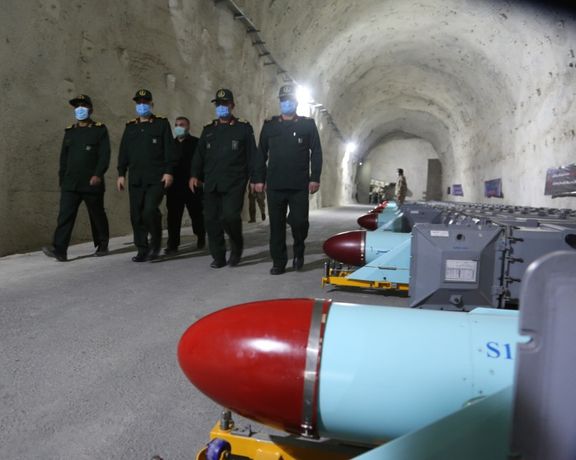
Washington says it is doubtful about announcements by Iranian officials that the Islamic Republic is developing a hypersonic missile.
Department of Defense's spokeswoman Sabrina Singh said on Thursday that the US questions the accounts claiming that the Islamic Republic developed a hypersonic missile.
“We've seen the reports asserted and coming out of Iran, we remain skeptical of these reports,” the Pentagon spokeswoman told a news conference.
Commander of Iran’s Revolutionary Guard Aerospace Force, Amir Ali Hajizadeh claimed last week that the regime had built its first missile that can fly at least five times faster than the speed of sound.
“This missile has a high speed and can maneuver in and out of the atmosphere. It will target the enemy’s advanced anti-missile systems and is a big generational leap in the field of missiles,” Tasnim News Agency quoted Hajizadeh as saying.
“We will continue to monitor closely any development or proliferation out of Iran or missile systems,” added Sabrina Sing in reaction to the reports.
IRGC officials and state media have not published any details about their claim and have promised that this missile will be unveiled soon.
Tehran’s claim regarding this weapon comes at a time that tensions between the Islamic Republic and the West over the violent suppression of antigovernment protests, Iran’s nuclear case and its drone supplies to Russia are mounting.
Hypersonic missiles are harder to intercept as they only need a low trajectory in the atmosphere.